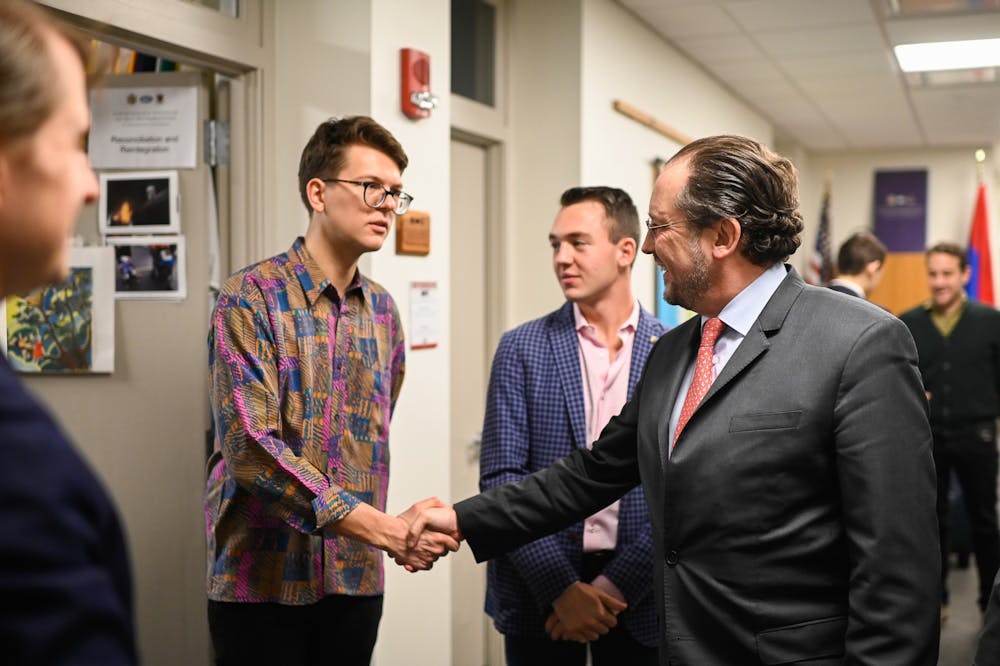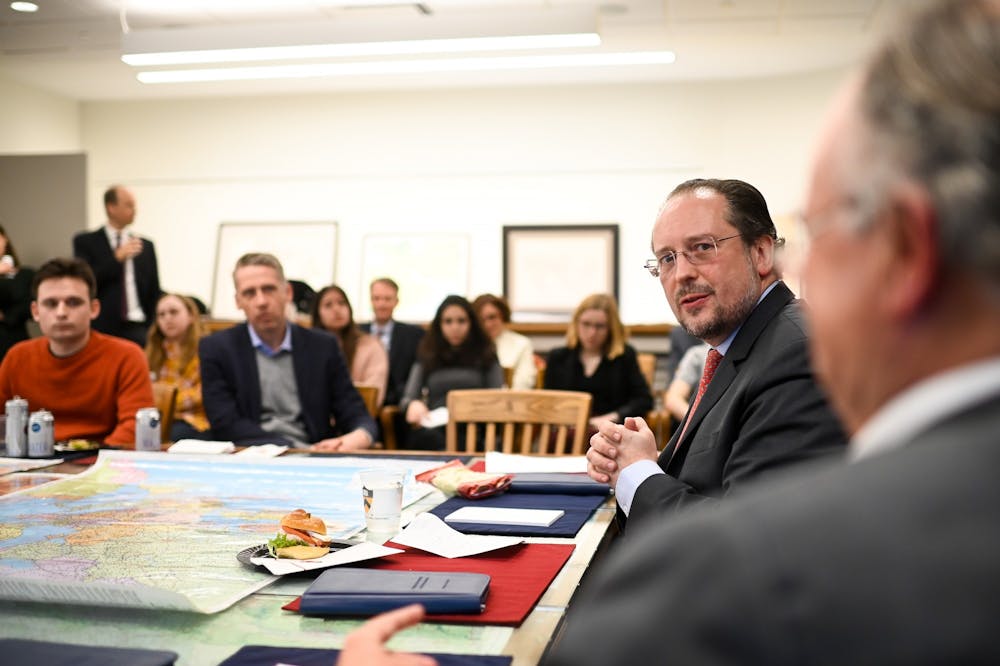When Austrian Minister of Foreign Affairs Alexander Schallenberg visited the University on Thursday, he spoke on a breadth of crises faced by the European Union.
On Feb. 6, Schallenberg visited the University after arriving from a morning event with President Donald Trump in Washington, D.C. He had lunch with members of the faculty and student body. He discussed the European Union’s lack of agency, Eastern Europe’s authoritarian backsliding and brain drain, and a general realization that the Western model of shared values was not being adopted by most of the rest of the post-Cold War world. Schallenberg also addressed Eastern Europe’s relationship with China, Russia, and Great Britain, which officially left the European Union last week.
“Europe is surrounded by a ring of fire — the failed Arab Spring post-revolutionary states in the south; to the east, Russia and Turkey are going their own way, while China is a rising power,” Schallenberg explained.
As concerning as the situation may appear at first glance, Schallenberg noted that history shouldn’t be forgotten. Multilateralism and international diplomacy are increasingly viewed as being in a crisis, though there have been dozens of other crises in the past. The current U.S.-European relationship endured the Cold War and its multitude of heightened tensions, from the Suez Crisis to the collapse of communism.
Schallenberg noted that the future seems better than what most people might expect. Many international institutions and mechanisms are working out to a large degree. Most importantly, he said, even countries engaging in troublesome behavior now seem to feel a need to justify actions in accordance with the U.N. Charter and international law.
“I would not be a diplomat if I did not think we could improve the world,” he said.
Schallenberg noted one major concern with the present arrangement: the Western ideas and way of life — the shared values of the United States and Europe — are increasingly under threat, he said.
According to Schallenberg, in the early 2000s, everything was going Europe’s way, and nations adopted Europe’s commitments to equality, education, and good governance. Today, Russia and Turkey have distanced themselves from this commitment, while China proposes an entirely alternate solution that does not respect these trans-Atlantic values.
“There has been a brutal awakening in the past few years within the European Union member states,” Schallenberg said. “Our way of life is not as attractive as we thought it would be.”
On the subject of the European Union’s role in world affairs, Schallenberg explained the unique position that the European Union holds.
“It is a payer, not a player,” he said.
In essence, while European states contribute massive amounts of money to developing and improving the world, they do not leverage it effectively enough in geopolitics to ensure that their projects are brought to fruition, according to Schallenberg.

Schallenberg said that Europe needs to focus on what it wants to do and where it wants to achieve this.
On the subject of Russia, Schallenberg emphasized that Europe “needs to have very clear expectations in resolving the Ukraine crisis.”
“We can never compromise on Crimea as that would negate rule of law,“ he said.
The Minister of Foreign Affairs also pointed out that Russia and the European Union both need each other economically, and said that the present strategy of sanctions has been largely ineffective, while also difficult to remove and maneuver away from.

Foreign Minister Schallenberg and Justinas Mickus ’20 shake hands at the event.
Photo Credit: Michael Gruber / BMEIA
More broadly in Eastern Europe, Schallenberg noted that a solution is critically needed for the ongoing “brain drain” — where young people are moving from Eastern Europe to work and live in Western Europe, where they feel that they can find a future.
Meanwhile, he said, domestic politics in Eastern Europe are backsliding towards authoritarianism because of the perceived failure of the “promised golden future.”
The Foreign Minister also spoke on Brexit, expressing both disappointment and hope for the future.
“Brexit is a lose-lose situation. But not a single other country has since left the European Union,” he said. “This suggests that the EU is more resilient than we tend to believe”.
During the lunch, Schallenberg also addressed China, a rising power that has courted several of the eastern European Union members with the Belt and Road Initiative (BRI) for economic development. However, the European Union has largely not responded with a united front to Chinese efforts, according to Schallenberg. He recommended that the approach to BRI be recalibrated and engage the entire European Union.
The lunch event, entitled “Europe and the World: A Post-Brexit Assessment,” was sponsored by the Liechtenstein Institute on Self-Determination. The event was held in 019 Bendheim Hall at noon.








